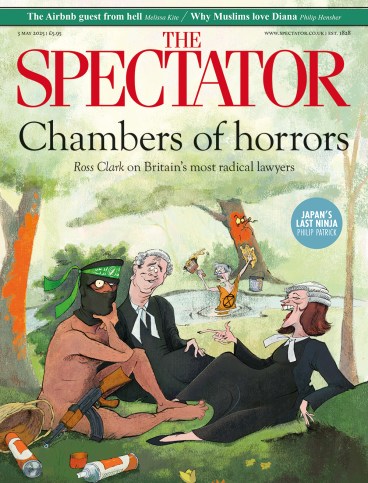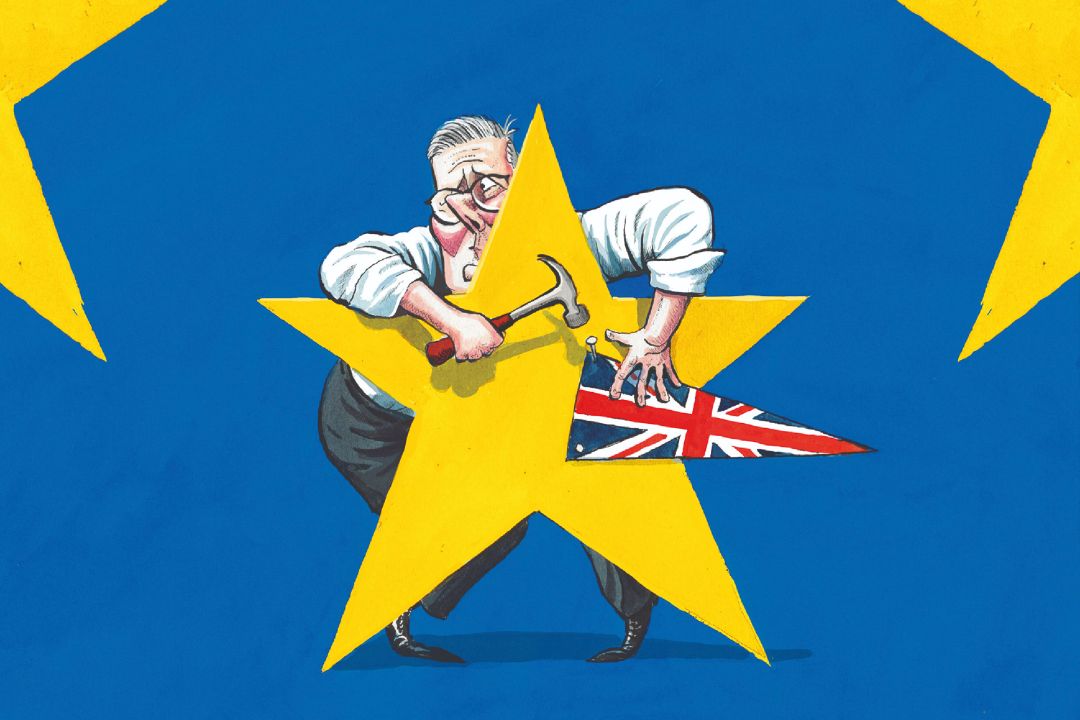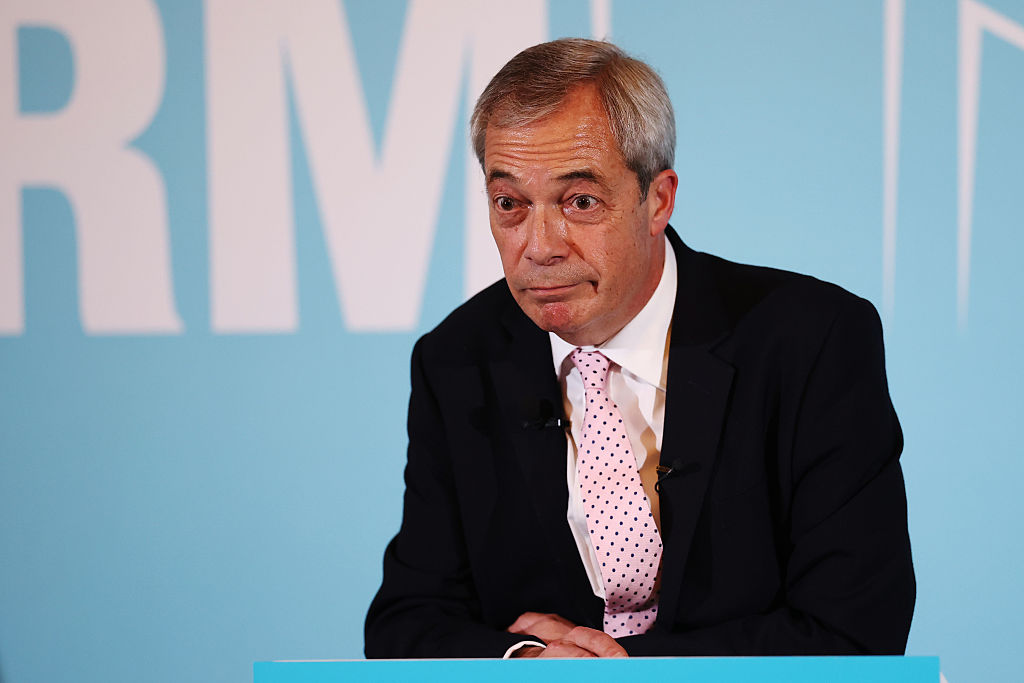
Throughout Keir Starmer’s life, a recent fawning profile ran, he has ‘worked to safeguard the value of justice and democracy’, from fighting the death penalty in Caribbean courts as a young human-rights lawyer, to taking on Vladimir Putin by representing Alexander Litvinenko’s widow. ‘Those same principles,’ the profile gushes, ‘have guided him since he became the UK’s Prime Minister.’
The author of these words? Ursula von der Leyen, the European Commission President, who had the dubious honour of penning the Prime Minister’s entry for Time’s annual list of the world’s 100 most influential people. She is glad, she claims, ‘to have someone with Starmer’s dedication and strong principles as a partner’.
On 19 May, Starmer will host the first UK-EU summit since Brexit. An announcement is expected on defence cooperation, alongside an outline for future negotiations. Labour’s manifesto promised to ‘reset the relationship between Britain and the EU’ and ‘deepen ties with our European friends’. This is one area in which the Prime Minister has kept his promise to the electorate.
A few short years ago, Starmer was Jeremy Corbyn’s shadow Brexit secretary, pushing Labour into backing a second referendum. After voters rejected that, his Europhilia faded as he sought to win back the Red Wall. But few doubt he still believes that Brexit was an act of national self-harm.
Starmer’s hope is that he can overcome lingering resentment and improve post-Brexit arrangements as the perfidious Tories never could. Yet his hand across the Channel so far seems less a drawing together of two equal, sovereign allies than the steady unpicking of our hard-won independence.
The Prime Minister has set out three red lines for his ‘reset’: no customs union membership, no rejoining the single market and no freedom of movement. The government has promised no running commentary on the negotiations, yet stories have emerged about what Starmer is conceding. Brexit was a recognition that EU membership was not in Britain’s interests, rather than a repudiation of geography. The EU remains our largest trading partner; the war in Ukraine has provided a common incentive to re-arm. Donald Trump’s capricious approach to international trade and European security has made that cooperation more urgent. Reports that Starmer has negotiated British participation in the EU’s new €150 billion defence fund should be welcomed.
A push for European strategic autonomy that excluded BAE Systems seemed self-defeating. Yet reversing Britain’s previous exclusion has been said to have come at the cost of ensuring enhanced French access to our fishing waters. This is the latest betrayal of those coastal communities who voted to leave, hoping that Westminster would finally pay them attention.

Folding on an issue as totemic as this does not bode well for other rumoured concessions. These include: a ‘youth mobility’ scheme for under-thirties, limited to a year; a syncing of carbon border adjustment taxes, entailing British acceptance of higher EU carbon prices; and ‘dynamic alignment’ on meat and dairy rules, requiring the European Court of Justice to police Britain’s conformity with EU regulations.
The gains of Brexit may have proved elusive so far, but they are starting to accumulate
A ‘youth mobility’ scheme would enable UK and EU citizens aged between 18 and 30 to live and work anywhere in Britain or Europe. Young Brits might welcome a year on the continent, but it is hard to reconcile such a scheme with the government’s promise to reduce immigration. This will be a grand opportunity for poorer EU states to offload their unemployed youth onto Britain. Our borders would not only be open to Polish plumbers or French finance graduates, but to some of the 960,000 migrants recently granted citizenship in EU countries, who may be as keen to reach Britain as those in Calais.
Even if visa numbers are capped, the Home Office will prove as ineffectual in removing those that overstay as it has been with our current illegal immigration population. If Starmer wishes to boost Reform UK, agreeing this would seem the best way to do so. Similarly, copying the EU’s costly carbon tax regime will be another burden for voters weary of expensive climate commitments.
‘Dynamic alignment’ will be welcomed by supermarkets hoping to reduce red tape. But not only would we be taking EU rules without any say in writing them; our freedom to sign future trade deals, especially with the US, would also be constrained. The UK’s budding gene-editing industry would be stifled, just as new regulations diverging from the EU’s cautious approach come into effect.
While they don’t cross Starmer’s red lines explicitly, these concessions would comprise a clear attempt to recreate EU membership piece by piece. In this turbulent international environment, Starmer should recall the wisdom of one of his more robust predecessors. ‘We have no eternal allies,’ said Lord Palmerston, ‘and we have no perpetual enemies. Our interests are eternal and perpetual, and those interests it is our duty to follow.’ Better relations with the EU should not come at the expense of our freedom of action.
European federalism had 43 years to prove itself before voters found it wanting. The gains of Brexit may have proved elusive so far, but they are starting to accumulate – nimbleness in trade negotiations, a better regulatory environment for tech, a smarter agricultural policy and the potential for proper migration controls. The Prime Minister has been right, in the wake of war in Ukraine and with Trump in the White House, to say the world has changed. Those changes make a nation’s ability for independent manoeuvre more important, not less. Ursula von der Leyen’s blandishments may charm, but Starmer should recognise she is seeking to lure him away from the freedom Britons voted for.








Comments